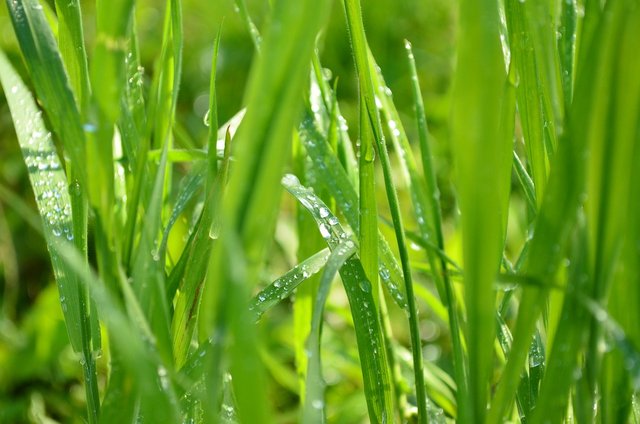Playing Dewdrops :: Haiku of Japan #55
草の葉を遊びありけよ露の玉
kusa no ha wo asobi-arike yo tsuyu no tama
blade of grass
to blade of grass
playing dewdrops
—Ransetsu
(Tr. David LaSpina)

In the transient world of Japan's nature words, few are as powerful as the morning drops of dew clinging to the grass. Every night the dew comes, and every morning it loses its being when the sun rises. A fitting symbol for our fleeting life. Buddhism teaches rather than being sad at the inevitable passing of things or resisting by pretending it will never happen to us, far better to acknowledge the truth and make the best of what we are given. Mother nature provides the perfect example with the morning dew, which dances and plays and enjoys the limited time it has.
Don't miss other great haiku in the Haiku of Japan series!
#1–10 — Haiku of Japan :: Collection #1
#11–20 — Haiku of Japan :: Collection #2
#21–30 — Haiku of Japan :: Collection #3
#31—40 — Haiku of Japan :: Collection #4
#41 — Falling Camellia
#42 — Snow Falling
#43 — Morning Glory Shack
#44 — My Father's Face
#45 — Dragonfly Hunter
#46 — Fallen Butterfly
#47 — Fading Dreams of Ancient Warriors
#48 — Battleground Pear Tree
#49 — Showing My Hidden Side
#50 — Ambitious Snail
#51 — Dewdrop World
#52 — A Fleeting Life
#53 — The Only Sound
#54 — Autumn Clouds
If you enjoyed this post, please like and resteem. Also be sure to follow me to see more from Japan everyday.
I post one photo everyday, as well as a haiku and as time allows, videos, more Japanese history, and so on. Let me know if there is anything about Japan you would like to know more about or would like to see.
 | David LaSpina is an American photographer lost in Japan, trying to capture the beauty of this country one photo at a time. |
Such a wonderful haiku: dewdrops playing! I realize there're a lot of topics about fleeting life and death in Japanese literature.
Delightful, isn't it? It's the kind of image you really wouldn't come by unless you were paying close attention to nature, as these haiku poets did.
I agree — lots of life and death in haiku. That is Japan for you. It's a tricky thing to translate actually because we tend to view death differently in the West than they do. That's changed a bit with the Buddhist ideals that have been flowing west ever since the hippie movement, but it is still a difference. There is a wonderful concept here that the Japanese call mono no aware. The wikipedia entry doesn't do the term justice, but it does give a nice overview: Mono no aware
Nice poetry